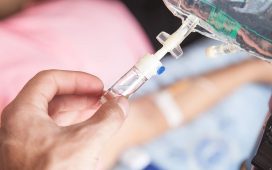Mortality risk increased with higher serum digoxin levels; results similar regardless of heart failure
WEDNESDAY, March 14, 2018 (HealthDay News) — Digoxin is independently associated with higher mortality in patients with atrial fibrillation (AF) regardless of whether they have heart failure, according to a study published in the March 13 issue of the Journal of the American College of Cardiology.
Renato D. Lopes, M.D., Ph.D., from the Duke University School of Medicine in Durham, N.C., and colleagues examined whether digoxin use was independently associated with increased mortality in 17,897 patients with AF and whether the association was modified by heart failure and/or serum digoxin concentration.
The researchers found that at baseline, just under one-third of patients (5,824) were receiving digoxin. There was no increased risk of death associated with baseline digoxin use (adjusted hazard ratio [HR], 1.09; 95 percent confidence interval, 0.96 to 1.23; P = 0.19). However, compared with patients not on digoxin, patients with a serum digoxin concentration ≥1.2 ng/mL had a 56 percent increased hazard of mortality (adjusted HR, 1.56; 95 percent confidence interval, 1.2 to 2.04). For each 0.5-ng/mL increase (P = 0.001), there was a 19 percent higher adjusted hazard for death, and these results were similar in patients with and without heart failure. Compared with propensity score-matched controls, new digoxin users had a significantly increased risk of death (adjusted HR, 1.78; 95 percent confidence interval, 1.37 to 2.31) and sudden death (adjusted HR, 2.14; 95 percent confidence interval, 1.11 to 4.12.)
“Initiating digoxin was independently associated with higher mortality in patients with AF, regardless of heart failure,” the authors write.
Several authors disclosed financial ties to medical device and pharmaceutical companies, including Bristol-Myers Squibb and Pfizer, which funded the study.
Editorial (subscription or payment may be required)
Copyright © 2018 HealthDay. All rights reserved.








